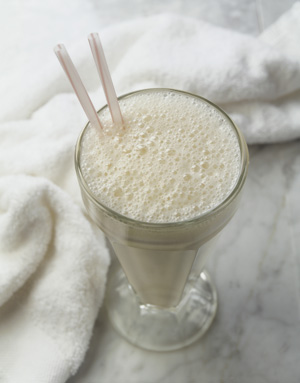
A diet with small amounts of meat protein, coupled with a greater percentage of fresh vegetables, greens, some grains and moderate amounts of fresh fruit, would be a healthier first step toward strengthening your immune system.
by Stan Kalson —
The first step to having a healthy immune system is a well-balanced diet filled with fresh organic fruits, vegetables, grains, seaweeds, raw nuts, seeds and fresh, pure water. A vegetarian diet does not automatically equate with a healthier body. A diet with small amounts of meat protein, coupled with a greater percentage of fresh vegetables, greens, some grains and moderate amounts of fresh fruit, would be a healthier first step toward strengthening your immune system.
Moderate exercise will improve the immune system by moving the lymph fluids throughout the body, increase one’s sense of well-being and add joy to one’s life. A positive mental outlook has a way of increasing an individual’s health. Negative thinking has a way of bringing all body functions down; how you think affects all the organs of your body.
Someone with much hate in their heart may develop heart problems; sustained anger may cause the liver and gall bladder to weaken; and constant fear could weaken kidney and adrenal function. Mentally happy people with a strong sense of love, laughter and spiritual connection to others seem to live longer, with fewer complaints.
It is important to consume high quality supplements to strengthen the immune system. These include:
• Vitamin C — Evidence from biochemical examination shows that vitamin C has a substantial role in immune function. Infection quickly depletes normal high concentrations of vitamin C in white blood cells, particularly lymphocytes. During illness, a mild vitamin C deficiency may continue if it is not regularly consumed. During healthy times, many take a daily 500 to 1,000 mg dose of vitamin C, and during illness it is suggested to take 3000+ mg daily.
• Vitamin E — Protects the thymus gland and circulating white blood cells from damage, and plays a major role in protecting the immune system during chronic illnesses, i.e., viral infections. Literature suggests an average adult dose of 400 to 800 I.U.
• Beta carotene — Found in many of our orange fruits and vegetables, a daily beta carotene dose of 25,000 I.U. for adults is suggested by most nutritionists. During illness, an additional daily dose of 25,000 I.U. of beta carotene is suggested until symptoms subside. Carotenes are important to proper immune function, as they maintain the epithelial and mucosal surfaces and secretions of the cells. They are excellent antioxidants and have been shown to better protect the thymus gland’s function and increase interferon’s ability to stimulate the immune system.
• Zinc — Involved in every aspect of immunity. When zinc levels are low, T-cells decrease, thymic hormone levels lessen and many white blood cell functions critical to the immune response stop. Many people consume fruit-flavored zinc gluconate lozenges, which recently have been identified as an effective treatment in preventing the cold virus from replicating. Normal adult doses are 15 to 30 mg daily. During illness, these doses may be doubled. Be careful not to exceed 100 mg of zinc daily, as this may induce copper-deficiency anemia, reduce HDL cholesterol levels and depress immune function.
• Colostrum — Derived from dairy cows within 24 to 36 hours after they have given birth, colostrum has gained favorable recognition in recent years for boosting the immune system and assisting many individuals in reducing the negative effects that viruses, bacteria, fungi and parasites have on the body. One advantage in taking a food supplement is the lack of side-effects, compared to using synthetic drugs to deal with the same problems.
• Garlic — An ancient and universal natural medicine, the use of garlic for treating intestinal disorders, parasites, infections, etc. is recorded in ancient Chinese, Indian, Roman and Greek medical folklore. During the Middle Ages, those who consumed garlic stood a better chance of surviving the bubonic plague. In modern times, World War I and II soldiers of some countries used garlic to treat typhus, dysentery and battle wounds. Fresh raw garlic is best, as heating destroys its medicinal properties. Many people take the more sociable deodorized garlic capsules. Garlic is an important food for keeping the immune system healthy.
• Probiotics — The body’s defense against negative microbes, these helpful flora reside in the mouth, ears, vagina, colon, urinary system and on the skin. Under normal conditions, one or more types of bacteria inhabit these areas. These bacteria are not invaders, but rather, play a part in preventing bodily imbalances. Antibiotics upset the normal flora balance and care must be taken to re-establish the body’s normal flora. Many people rely on lactobacillus acidophilus, available through the consumption of fermented foods like yogurt, buttermilk, sauerkraut and supplements, to keep the normal flora balanced.
Here is a recipe for a morning drink to boost the immune system:
Morning Power Drink
Ingredients:
- 2 cups almond milk
- 1/4 cup high-quality whey protein powder
- 1 ounce liquid fulvic acid minerals
- 1 teaspoon Green Magma powder
- 2 tablespoons ground flax seed or 1 tablespoon flaxseed oil
- 1/2 cup frozen organic fruit, i.e., banana, blueberries
- 1 capsule acidophilus
- a few ice cubes
Instructions:
Combine all the ingredients and blend until smooth. Serve immediately while the mixture still has a bubbly, milkshake-like consistency.
Stan Kalson, founder and director of the International Holistic Center, Inc., has been active in the Greater Phoenix holistic community for 30 years. www.holisticresources.org or 602-287-0605.
Reprinted from AzNetNews, Volume 26, Number 4, August/September 2007.





September 19, 2012
Anger, Chemical and Toxic Exposure, Chinese medicine, Cholesterol, Colds, Exercise, Fear, Food, Nutrition and Diet, Healing, Heart disease, Nutrition, Recipes, Vitamins, Minerals and Supplements